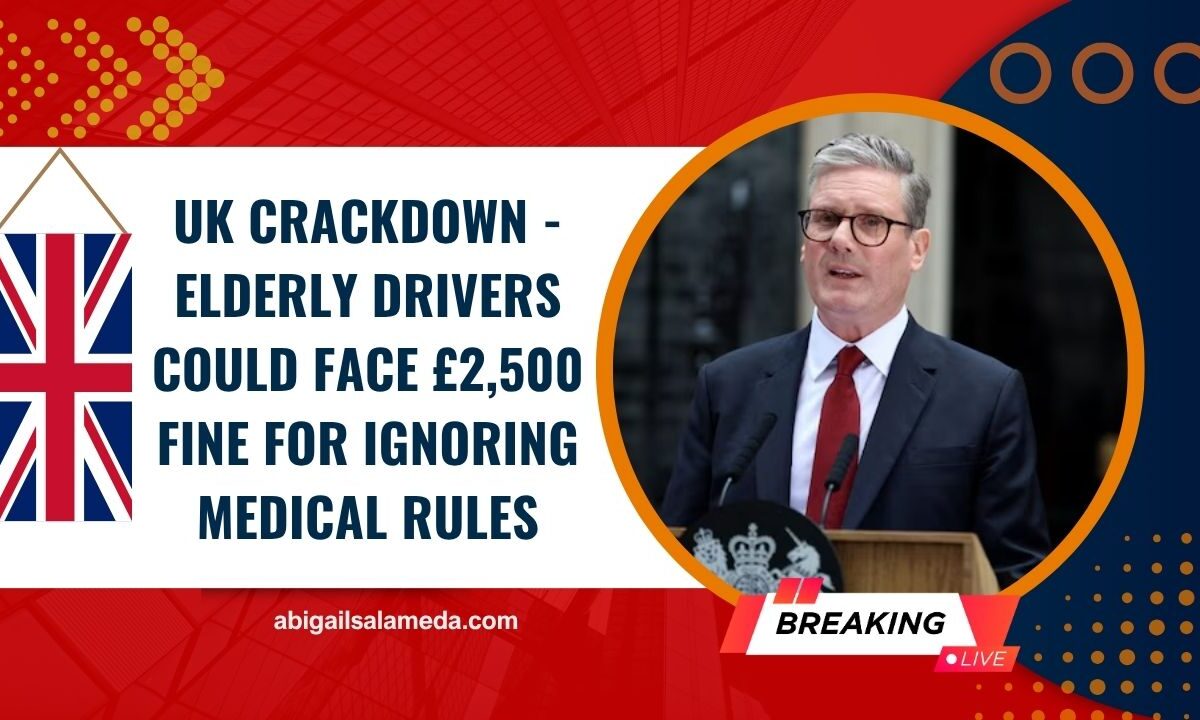As part of a growing initiative to improve road safety, elderly motorists in the UK are being urged to disclose medical conditions that may affect their driving ability, or risk fines of up to £2,500.
The warning follows the launch of a public safety campaign led by the Department for Infrastructure in Northern Ireland, spotlighting the critical role of health in safe driving.
With road deaths and serious injuries still unacceptably high, the UK government has emphasised that medical transparency is not just a legal requirement but a life-saving responsibility.
A Campaign with Two Powerful Messages
The initiative comprises two distinct but interconnected elements:
- Keep Yourself Right
- Encourages individuals to self-report medical or eyesight issues that may impact driving.
- Stresses the legal obligation for drivers over 70 to renew their licences and confirm fitness to drive.
- Reminds drivers to update their licence information and follow the doctor’s advice.
- Time to Talk
- Urges families and friends to have honest conversations with elderly loved ones about their driving ability.
- Offers resources to help initiate discussions when someone’s health may compromise road safety.
Both branches of the campaign point users to official government platforms for up-to-date guidance on health and driving eligibility.
Why This Crackdown Is Happening
Infrastructure Minister Liz Kimmins noted the devastating statistics driving the campaign:
“Too many people are killed and seriously injured on our roads every year. More than 95% of road deaths are due to human error.”
With ageing drivers making up a significant portion of the population, the government believes these new efforts could dramatically reduce fatalities if drivers take personal responsibility for their health and driving ability.
Medical Rules for Drivers Over 70
Drivers aged over 70 in the UK are required to renew their licence every three years and declare any medical condition that could impair their driving.
Failure to follow these requirements can result in:
- A £1,000 fine for failing to report a medical condition to the Driver and Vehicle Agency (DVA).
- A £2,500 fine if a false declaration leads to an accident or criminal conviction.
- Potential criminal prosecution and driving bans if serious negligence is found.
Medical Disclosure Rules and Penalties
| Rule/Requirement | Details |
|---|---|
| Licence renewal at age 70+ | Every 3 years with a declaration of fitness to drive |
| Disclosing medical conditions | Must report conditions that affect driving capability to the DVA |
| Doctor’s advice | Must not drive if advised against it by a medical professional |
| Failure to report a condition | Fine up to £1,000 |
| False medical declaration | Fine up to £2,500, and possible criminal charges |
| Worsening of existing conditions | Must be reported to the DVA promptly |
The DVA processes medical data using questionnaires and may request additional evaluations. Decisions are typically made within 3–4 weeks for straightforward cases.
Key Medical Conditions to Report
Some of the conditions that must be reported include:
- Epilepsy
- Diabetes requiring insulin
- Parkinson’s disease
- Stroke or mini-stroke
- Visual impairments (e.g., cataracts, macular degeneration)
- Sleep disorders such as sleep apnoea
- Serious heart conditions
Privacy and Reporting Others
The “Time to Talk” component also enables concerned individuals to report another driver if they suspect medical issues may be impairing their driving. To protect privacy and prevent false claims:
- The person reporting must include their own contact details.
- The DVA does not reveal the reporter’s identity unless required by the court.
- The report should consist of the driver’s name, address, and suspected condition.
This process ensures a fair and responsible system while safeguarding the rights and reputations of all individuals involved.
Why This Campaign Matters
The campaign comes at a crucial time. With thousands of older drivers remaining active on UK roads, even a minor oversight in health reporting can have major consequences.
The initiative seeks to bridge the awareness gap, using platforms like social media to reach the elderly and their families directly.
It’s not about removing people from the roads—it’s about ensuring that those who drive are fit to do so, thereby reducing accidents and saving lives.
As the UK tightens its rules around medical fitness to drive, elderly drivers must take extra care to stay compliant. Failing to report health issues or update licence information could lead to hefty fines, licence suspensions, or even criminal charges.
This latest campaign isn’t just a warning—it’s a call to responsibility. By ensuring that all drivers—especially seniors—are aware of their health obligations, the UK hopes to reduce road accidents, protect vulnerable drivers, and foster safer roads for everyone.
FAQs
What happens if I forget to tell the DVA about a medical condition?
You may be fined up to £1,000, and your licence could be revoked. If the omission leads to an accident, the penalty increases.
Can I still drive while the DVA reviews my case?
In many cases, yes—unless your doctor has specifically advised you to stop driving. Always follow medical guidance.
How do I report a relative I’m concerned about?
You can contact the DVA with details about the person, their condition, and your identity. Your identity is protected unless legally required.




